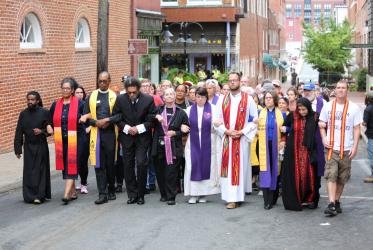Speakers explored human rights solutions to address environmental injustice, racial disparities, unequal protection and the unique impact of the climate crisis and environmental racism on people of African descent. They took a comprehensive look at various aspects of environmental racism and the climate crisis locally and globally.
Rev. Dr Angelique Walker-Smith, senior associate for Pan African and Orthodox Church Engagement at Bread for the World, looked back at how climate change has exacerbated racial injustices for decades.
“During the 1980s, I found myself living in the Sudan serving in the Darfur region,” said Walker-Smith, who also serves on the World Council of Churches central committee. In Sudan, as the desert moved southwards because of climate change, it became a contributing factor to genocide in Darfur.
Walker named other examples from across the world, including Louisiana in the wake of Hurricane Katrina in 2005; water shortages in Cape Town, South Africa; the tainted water supply in Flint, Mich.; and others.
“These examples over decades are examples of how environmental injustice within the horror of the climate crisis affected people of African descent,” she said. “The earth and its people are groaning.”
Rev. James Bhagwan, general secretary of the Pacific Conference of Churches, reflected on how Pacific Island people see themselves as part of the land, and the Pacific is the blue heart of the planet, providing oxygen, food, and minerals that are often extracted and exploited.
“These are perhaps some of the things, some of the reasons why our region is considered almost at the end of the equation of climate change,” he said. “One can only wonder as to the structural racism that may be part of the slowness of responding to climate change, the slowness of the more developed countries that practice, in a time when we are called to work as one planet, a very nationalistic response to the climate crisis.”






